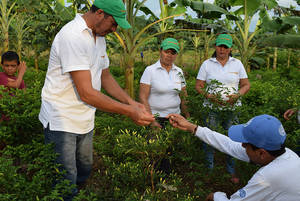[ad_1]
20 June 2017, Bogota, Colombia – Colombia’s Rural Development Agency and FAO have signed an $8.7 million agreement to support policies aimed at restoring rural areas that were affected by armed conflict, to bolster the peace process by rebuilding rural communities, and to increase the country’s agricultural competitiveness.
FAO will work with the Rural Development Agency (RDA) to develop rural development plans and projects with a comprehensive territorial approach.
“For us this agreement is fundamental. We have the certainty that with FAO we are going to make a great team,” said Carlos Eduardo Gechem, president of the RDA, during the signing of the agreement.
“This agency represents the type of institutions that a new Colombia needs,” stated FAO’s Representative in Colombia, Rafael Zavala, regarding the key role that the Rural Development Agency plays in Colombia’s rural areas.
The RDA was created in 2015 with the specific goal of improving the living conditions of rural inhabitants and supporting the Peace Agreement between the government and the Revolutionary Armed Forces of Colombia (FARC). The Peace Agreement brought an end to decades of conflict which had claimed more than 200,000 lives and displaced millions of people.
Carefully tailored solutions for each territory
The joint work between FAO and the Rural Development Agency will focus on 16 (out of 32) of the country’s departments: Chocó, Caldas, Risaralda, Quindío, Cauca, Valle del Cauca, Putumayo, Huila, Atlántico, Antioquia, Boyacá, Bolívar, Cesar, Tolima, Meta and Nariño.
The new agreement covers three main areas of work. The first will focus on creating and co-financing comprehensive agricultural and rural development projects with a territorial approach, and technical assistance services carefully crafted to meet the specific needs of each territory.
The second aims to develop comprehensive agricultural plans for rural development at department level – Colombia is a unitary republic formed by thirty-two departments – and a methodological manual for the implementation of these plans so they can be replicated with different local communities.
The third main area of work will strengthen the capacities of the RDA and other key stakeholders to improve productive integration and competitiveness by supporting family farming organizations and partnerships with the private sector.
FAO will develop guidelines for agricultural technical assistance services, plans to strengthen associativity, and a strategy for the creation and operation of local networks of integrated agricultural development projects.
“The partnership we signed will make peace through institutional development. Our attention will not only be centred on high-risk areas, but on the whole of rural Colombia, a part of the country that has been, in some way, left behind,” Zavala stated.
For his part Gechem said: “FAO is an organization with great experience and the ability to work hand in hand on an issue that is a fundamental to our country.”
[ad_2]
Source link






